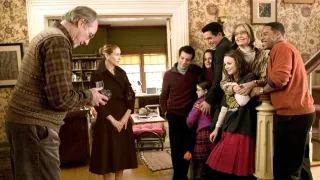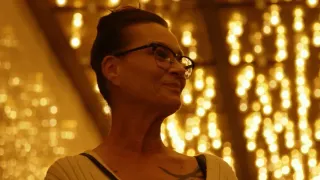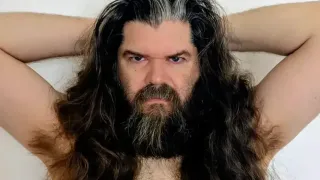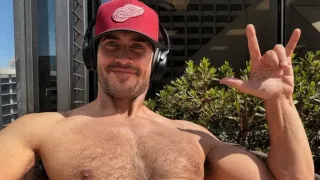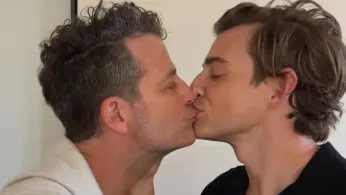
4 hours ago
Nate Berkus on Love, Ritual, and Queer Partnership: Insights from "We Met At Acme" with Lindsey Metselaar
READ TIME: 16 MIN.
On a recent episode of the widely followed "We Met At Acme"podcast, host Lindsey Metselaar welcomed renowned interior designer Nate Berkus for a conversation that was as intimate as it was instructive. The episode, titled "Manifesting A Partner Into Your Space ft. Nate Berkus, "delved into the everyday rituals that anchor long-term relationships, the realities of queer partnership, and what it means to build a family as an LGBTQ+ couple in today’s world .
The heart of the conversation revolved around a deceptively simple act: morning coffee. When asked by Metselaar what keeps his bond with Jeremiah Brent strong over more than a decade, Berkus didn’t cite grand gestures or dramatic declarations. Instead, he spoke about the everyday act that quietly binds their relationship. “Since I met Jeremiah, my husband, 13 years ago, every morning that we’re together, there’s hot coffee on my nightstand, ” Berkus shared. “That’s it. You know what I mean? You don’t really need anything after that. It’s everything. It’s like, here, have a great day” .
This ritual, Berkus explained, is emblematic of how love is often built not on spectacle, but on the invisible threads that connect people day after day. It is a theme that resonates deeply within many queer relationships, where authenticity and the affirmation of daily life can be acts of resilience and joy.
The interview also traced the couple’s origin story, which began through a mutual friend, the celebrated fashion stylist Rachel Zoe. “He worked for Rachel Zoe, ” Berkus recalled. “He was on her show, and she said to me—she called me—and she was like, ‘Oh my God, we just hired this guy. He’s so cute. We call him Baby Nate in the office. ’ She’s like, ‘And I know that you would love him. Like, I actually think you would really love him’” .
The two didn’t immediately become romantically involved; it took years, a birthday party, and a casual exchange of contact information before they finally went on their first date. “Two years after that, we were both single, ” Berkus said. “And he was in New York because he lived in LA, and he reached out and we went on a date in the daytime, and we’re still together. I love that” .
The early years of their relationship were marked by long-distance challenges. Berkus was forthright about how they succeeded where many struggle: “We made it work because there was no game. At all. We knew when we were going to see each other, and while we were together, we knew the next time we were going to see each other” . This direct, pragmatic approach to partnership is one that often resonates with LGBTQ+ couples, for whom honesty and communication can be essential tools in the face of external pressures and expectations.
The conversation touched on the couple’s approach to fidelity, an important topic in both queer and straight communities. “You know, among our friends, we’re rare in that we don’t have an open relationship, ” Berkus said. “It’s just something that we discussed very early on. And he’s all I need, and I’m all he needs. I’m jealous. So that wouldn’t work at all” .
This openness about relationship structure, and the explicit rejection of judgment toward others, underscores the diversity of experiences within the LGBTQ+ community. Rather than universalizing his own choices, Berkus framed their monogamy as a mutual decision rooted in self-knowledge and mutual respect.
Parenting was another major theme. Berkus expressed deep admiration for Brent’s abilities as a parent, stating, “I definitely fell more in love with him. Watching him as a parent” . Their journey as parents is emblematic of the visibility and normalization of LGBTQ+ families, offering representation and hope to others seeking to build their own families.
Lindsey Metselaar’s "We Met At Acme"podcast has long been a forum for exploring modern relationships, featuring voices from across the spectrum of identities and experiences . The podcast’s format—candid, conversational, and grounded in real-world experience—provides a valuable space for LGBTQ+ stories to be told honestly and affirmingly.
By centering Berkus and Brent’s story, the podcast episode not only humanizes queer love but also celebrates the everyday moments that sustain it. This kind of visibility is crucial in a media environment that often focuses on trauma or controversy when it comes to LGBTQ+ lives. Instead, Metselaar and Berkus offered listeners a narrative defined by joy, commitment, and the daily work of partnership.
Throughout the episode, both Berkus and Metselaar modeled an approach to storytelling that was inclusive and affirming of all identities. Their discussion affirmed the validity and beauty of queer relationships and families, centering them not as exceptions but as ordinary, loving partnerships that deserve celebration .
For LGBTQ+ listeners—and for anyone seeking a roadmap to lasting love—the episode stands as a testament to the power of small rituals, honest conversation, and the courage to build a life on one’s own terms.
